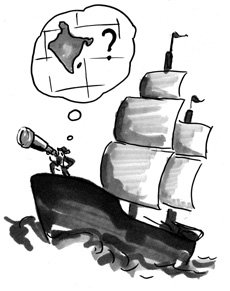Opinion: Revising Columbus

David Chen
Oct 12, 2004
Yesterday, the University held classes as usual.
And no one seemed to notice that it was Columbus Day aside from a few protesters in front of the Union.
Meanwhile, people across the country observed the day with time off of work and school, parades through most major cities and protests that drew hundreds of people in Tulsa, Okla., and Denver.
President Bush even made a written proclamation declaring, “the journeys of Christopher Columbus among the world’s greatest stories of daring and discovery,” and calling him a man of “courage, optimism and adventurous spirit.”
U.S. citizens are taught from grade school onward that Columbus was the great man who discovered America and brought about changes that led to colonization by the Spanish, British and French. But the “Columbus sailed the ocean blue” version of history largely ignores that millions of indigenous people were living in the Americas at the time of this “discovery” by Columbus.
Get The Daily Illini in your inbox!
It also doesn’t address what Columbus actually “discovered.” Columbus never set foot on the continent. He landed on the island of Hispaniola, thinking he had reached India, and thus mistakenly named the peoples who live in the Americas “Indians.” This version of history also ignores the smallpox-infested blankets, reservations and intermarriage that followed Columbus and changed the face of the continent.
In South Dakota and Wyoming, the holiday has been changed from Columbus Day to Native American Day to commemorate the contributions of American Indians to U.S. culture and to remember that their cultures once flourished but now are dying out.
What is the right way to handle the problem of celebrating Columbus Day? Is there a problem with celebrating the holiday at all?
Although some Italian-
American organizations such as Sons of Italy use the holiday as a chance to celebrate their heritage, most U.S. citizens don’t feel a direct connection to Columbus. It’s sad the holiday had to cause a clash between Italian Americans and American Indian groups as it did in Denver on Sunday.
It is not our job to judge the good guys and bad guys of history, but we should pay attention to the real impact it has on us today.
There is no way to deny that the legacies of Columbus and other explorers of that time are important. For more than 500 years, civilizations from Alaska to Patagonia have been completely changed, partly because of Columbus’ mistaken landing on Hispanola. But if it hadn’t been Columbus, then some other European explorer probably would have made the same “discovery.”
Because the holiday had no direct effect on University students – no day off of class – the majority of us probably didn’t even stop to think about the day and what it means. But it is important to consider it as a representation of the clash of cultures that have taken place on our continent.





